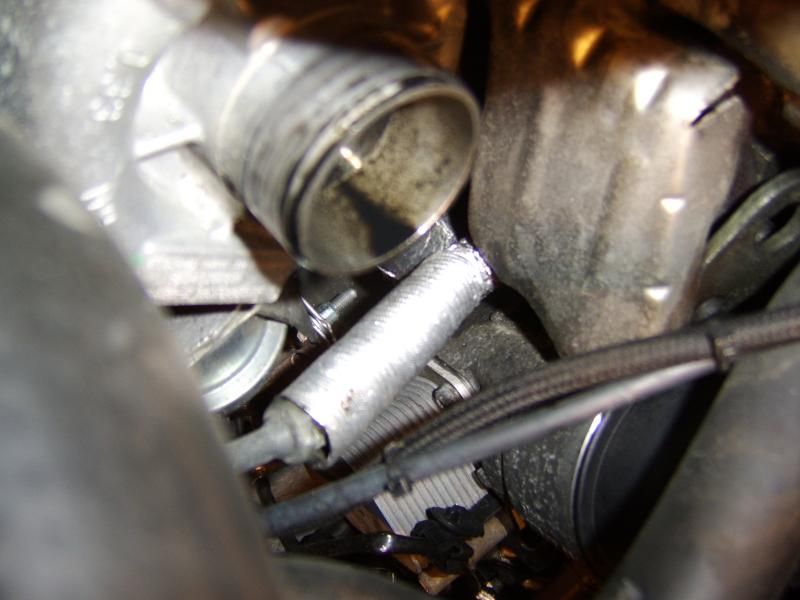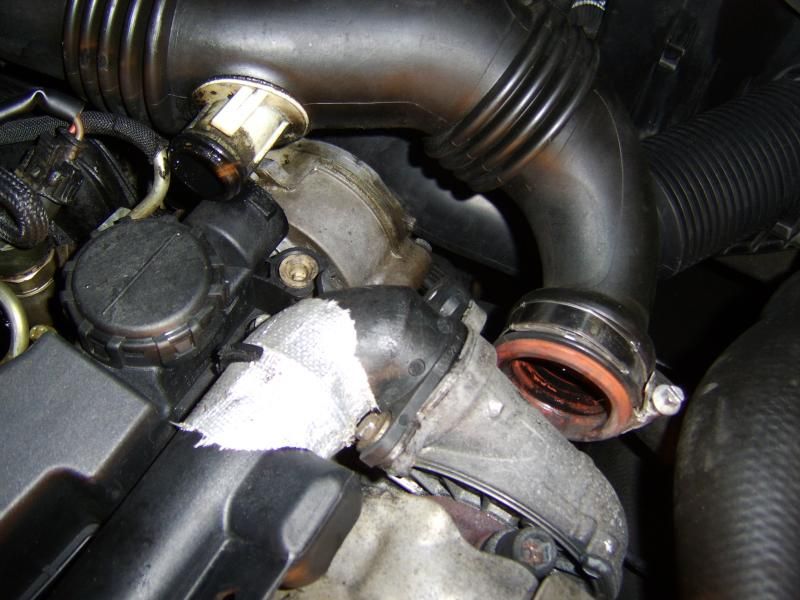Are my turbo oil seals shot?
Discussion
Celica GT4, Fensport hybrid turbo.
Someone who should know diagnosed turbo oil seal failure. Just been thinking about this.
I'm getting copious clouds of smoke at random intervals, including at start up and tick over.
Would oil be burning in the turbo like this with a cold engine and no/little boost?
Someone who should know diagnosed turbo oil seal failure. Just been thinking about this.
I'm getting copious clouds of smoke at random intervals, including at start up and tick over.
Would oil be burning in the turbo like this with a cold engine and no/little boost?
Evoluzione said:
Take a hose off, if it's got oil in it there is your answer.
I don't agree. (Presuming I understand you correctly) It's not uncommon for the main induction pipes to have a small amount of oil in them. Here is a pic of a Peugeot turbo from the family fleet. I can't remember when this photo was taken but I would guess it has done near 50k miles since with no problem.
Locknut said:
Evoluzione said:
Take a hose off, if it's got oil in it there is your answer.
I don't agree. (Presuming I understand you correctly) It's not uncommon for the main induction pipes to have a small amount of oil in them. Here is a pic of a Peugeot turbo from the family fleet. I can't remember when this photo was taken but I would guess it has done near 50k miles since with no problem.
- Until it gives way completely, then you'll know all about it.
I should have been more precise. Apart from the above, the amount of oil in your induction system is linked to how worn out your turbo is, I regularly tip large quantities of oil out of turbo pipes from cars which the owners think are ok.
Evoluzione said:
Running with worn turbo oil seals is like running with worn piston rings, worn valve guides, low compression, low oil pressure etc. Yes the engine will run like that for many more road miles, it's up to the owner as to whether it's the correct way to carry on. You can run a turbo until it fails completely, let's face it, most people do. Diesels are obviously less affected by a worn turbo as they burn oil anyhow*, in a petrol engine it will weaken the mixture.
I should have been more precise. Apart from the above, the amount of oil in your induction system is linked to how worn out your turbo is, I regularly tip large quantities of oil out of turbo pipes from cars which the owners think are ok.
On standard cars, the oil is usually from the crankcase breathers, not the turbo itself.- Until it gives way completely, then you'll know all about it.
I should have been more precise. Apart from the above, the amount of oil in your induction system is linked to how worn out your turbo is, I regularly tip large quantities of oil out of turbo pipes from cars which the owners think are ok.
So usually by the time any oil is actually coming from the turbo...the turbo is usually quite far gone anyway.
Or as you alluded to earlier, the oil from the turbo is actually a symptom of blocked crankcase breathers and oil not being able to drain away from the turbo properly.
Bottom line in both cases....OEM crankcase breathers can be crap, especially when old.
stevieturbo said:
On standard cars, the oil is usually from the crankcase breathers, not the turbo itself.
I think we might be slightly at cross purposes and not really in disagreement at all. My first response to Evo was because he seemed to say that any oil in the air pipes indicated turbo failure, but I added "(Presuming I understand you correctly)" just in case I was wrong. Oil can and will also come from the breather system, as it did in my case.Here is another photo of the same turbo from a different angle and it can be seen that the breather from the valve cover is plugged directly into the induction air pipe. It's the white fitting near the top left. (BTW: It's a diesel)

Locknut said:
I think we might be slightly at cross purposes and not really in disagreement at all. My first response to Evo was because he seemed to say that any oil in the air pipes indicated turbo failure, but I added "(Presuming I understand you correctly)" just in case I was wrong. Oil can and will also come from the breather system, as it did in my case.
Here is another photo of the same turbo from a different angle and it can be seen that the breather from the valve cover is plugged directly into the induction air pipe. It's the white fitting near the top left. (BTW: It's a diesel)

This ^ in fact I had one of these in today 1.6 HDI and this also had a small amount of oil in the intake pipes an 08 plate with bugger all miles done Here is another photo of the same turbo from a different angle and it can be seen that the breather from the valve cover is plugged directly into the induction air pipe. It's the white fitting near the top left. (BTW: It's a diesel)

 this is normal and like mentioned already crankcase breathers usually stick it there
this is normal and like mentioned already crankcase breathers usually stick it there  it builds up over thousands of miles and most of it gets ingested by the motor while running causing no problems at all, its by no means a turbo condition indication when you have breather plumbing sharing.
it builds up over thousands of miles and most of it gets ingested by the motor while running causing no problems at all, its by no means a turbo condition indication when you have breather plumbing sharing. Gassing Station | Engines & Drivetrain | Top of Page | What's New | My Stuff





